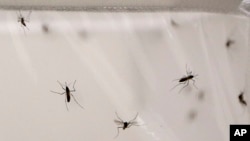Have you ever noticed how some people seem to be bitten by mosquitoes more than anyone else?
Apparently some people taste better to malaria mosquitoes than others, and scientists are trying to figure out why, so they can turn that information into a repellent to protect us all from malaria.
Such a repellent might be able to prevent some of the 214 million cases of malaria the World Health Organization says occurred in 2015, mostly in Africa. About 440,000 people, most of them children, died of malaria, the WHO said.
Researchers from Johns Hopkins University School of Medicine have found evidence of what attracts malaria mosquitoes to humans for a blood meal, and smell isn’t the only thing.
Christopher Potter, assistant professor of neuroscience, is working on the sensing ability of mosquitoes. Unlike humans who have one nose, Potter says, mosquitoes have three pairs of noses.
These include two antennae and two maxillary palps, which are fuzzy appendages below the insect’s head and are parallel to the feeding needle, Potter said. At the end of that feeding needle or proboscis, are the labella, two small regions with neurons that recognize smells and tastes.
“So this suggests that the mosquito brain might also have a region of the brain that’s dedicated to flavor, to combining smell and taste,” he said.
“And that is something they are very likely doing when they are actually landing on us and looking around for a place to bite,” he added. “They are actually smelling us and tasting us, and perhaps that means they are also flavoring us and that is part of what they are looking for when they’re trying to decide who they should bite from and where they are going to bite.”
Potter and his colleagues made this discovery about the malaria mosquito, Anopheles gambiae, by making certain neurons in the insect’s noses fluoresce, or glow green. They wanted to trace those green-glowing external sensory neurons to the brain.
The green-glowing neurons lighted up in the brain when they were exposed to complex odors. These help the mosquito distinguish human blood from that of other warm-blooded animals.
It’s the first time scientists were able to pinpoint the exact location of the senses of smell and taste in mosquitoes.
By studying the smell- and taste-detecting neurons, the finding suggests that it’s possible mosquitoes like not only the smell of humans but our flavor as well.
“The long-term goal is to identify better repellents, things that will be better, safer, cheaper and more effective that we can manufacture on a larger scale and distribute it across the world.”
Currently the insect repellent DEET is widely used in malaria endemic regions, but it’s not 100 percent effective, and a fair amount of the chemical needs to be applied to the skin to repel mosquitoes.
The research was published in the journal Nature Communications.





